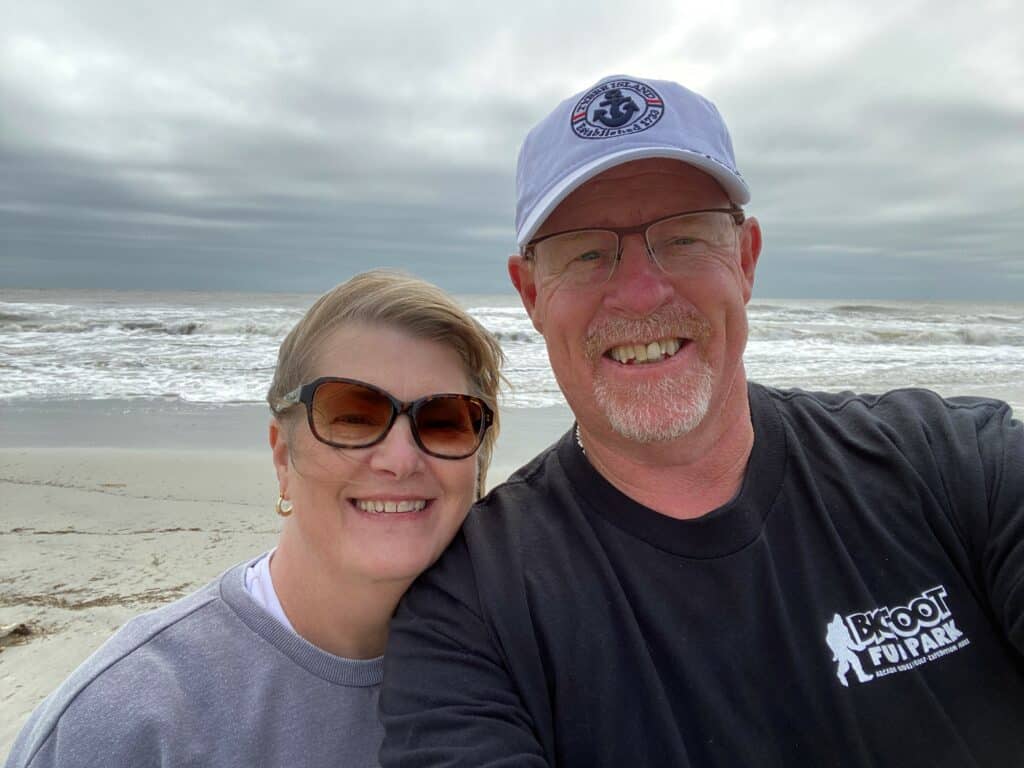
Gretchen Baker has no history of breast cancer and she’s always been good about getting her annual mammograms. So, when an abnormal mammogram resulted in several follow-up tests, a second opinion, and an eventual diagnosis of stage 1 breast cancer, she was shocked.
Shortly after her annual mammogram in 2022, Gretchen received a letter from her doctor’s office about an abnormal result. “The letter said that it was probably nothing serious, so I didn’t think much of it,” Gretchen said. Her doctor sent her for a follow-up diagnostic mammogram, which also showed a spot, so she was scheduled for a needle biopsy.
“At the time, I thought this was all an inconvenience,” Gretchen recalled. “I was kind of frustrated.”
The results of the needle biopsy came back negative, but Gretchen’s doctor recommended she still see a breast surgeon. “When the breast surgeon looked at the biopsy results, she saw something that shouldn’t be there,” Gretchen said. “She said, ‘let’s go ahead and remove it, even if the tests show it’s not cancer’ and I said okay, great. Let’s remove it. I still didn’t think this was a big deal.”
After surgery to remove the spot, Gretchen’s surgeon followed up to let her know it wasn’t cancerous. “I was thankful it was not cancer, but in my head, I still thought this was all a waste of time,” Gretchen said. “I never expected the call I ended up getting.”
Just a week later, the surgeon called back. She explained that something hadn’t seemed right to her, so she’d sent the sample out for a second opinion. “That one came back positive for breast cancer,” Gretchen said. “It was such a shock. I don’t have a family history, I go in for my routine mammograms, I haven’t been on any medications or hormone treatments. I didn’t check the boxes.”
Gretchen’s imagination went to the worst place possible. “I thought I was going to die from breast cancer. I kept thinking ‘my life has changed, the life I know has changed,’” she said. “I went from thinking about what an inconvenience all this back and forth had been to ‘I have breast cancer.’ At that point, you know some things, but you don’t know enough. All I knew was I had breast cancer. You’re kind of stuck until they can run the right tests and you talk to the doctors. All of a sudden, I was in hurry up and wait mode.”
Tests showed Gretchen had stage 1 breast cancer. Her treatment included another surgery to remove breast tissue to ensure clean margins. She then had 21 days of radiation therapy and is now on a hormone blocker, which she’ll take for the next 5-10 years.
Gretchen is grateful she did not have to have chemotherapy, but she wonders what could have happened had her surgeon not sent the sample out for a second opinion. “What might they have found during my mammogram the following year?” she wondered. “Would I have needed chemotherapy? Would the cancer have spread to my lymph nodes?”
Gretchen is a plant manager for CertainTeed, and she’s proud to work for a company that supports Komen. “Someone thought about how our product could help people with breast cancer. I have great insurance and was able to take care of my treatment, but not everyone does,” Gretchen said. “I’m proud of the fact that CertainTeed is contributing to people that need help, whether it’s through Komen’s research or support services.”
Breast cancer made Gretchen realize she’s not invincible. She and her husband try to live life to the fullest now. “I’m one mammogram away from another life-changing call. It’s made me live my life differently,” she said. “I tell people you need to prioritize yourself. Get your annual mammograms. My cancer was caught at stage 1. My story shows the importance of early detection.”
Learn about Komen’s partnership with CertainTeed.
Statements and opinions expressed are that of the individual and do not express the views or opinions of Susan G. Komen. This information is being provided for educational purposes only and is not to be construed as medical advice. Persons with breast cancer should consult their healthcare provider with specific questions or concerns about their treatment.



